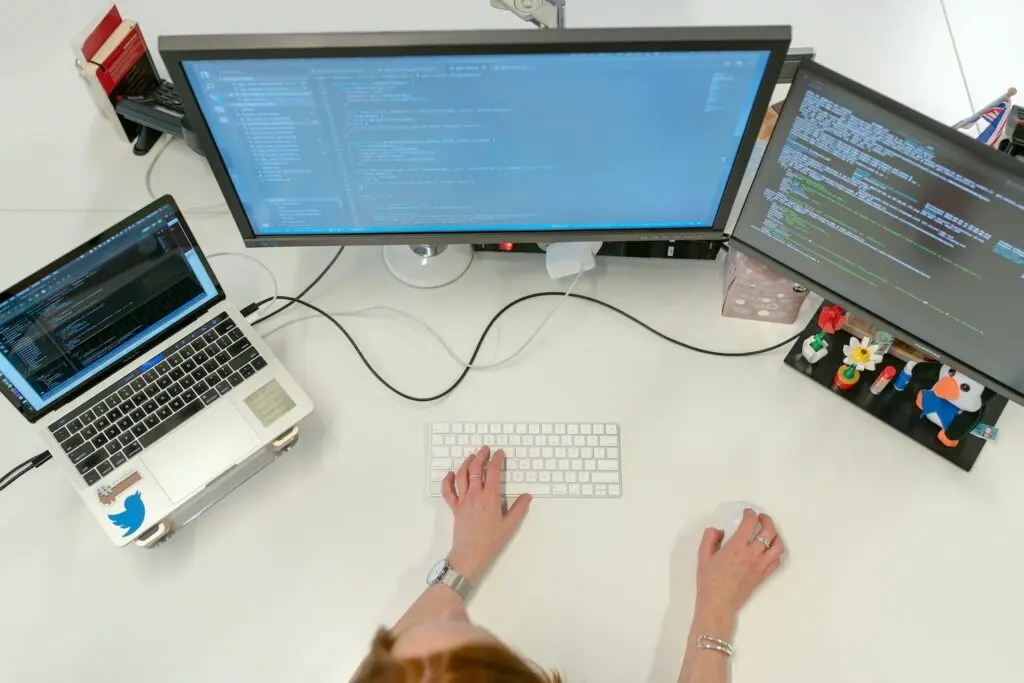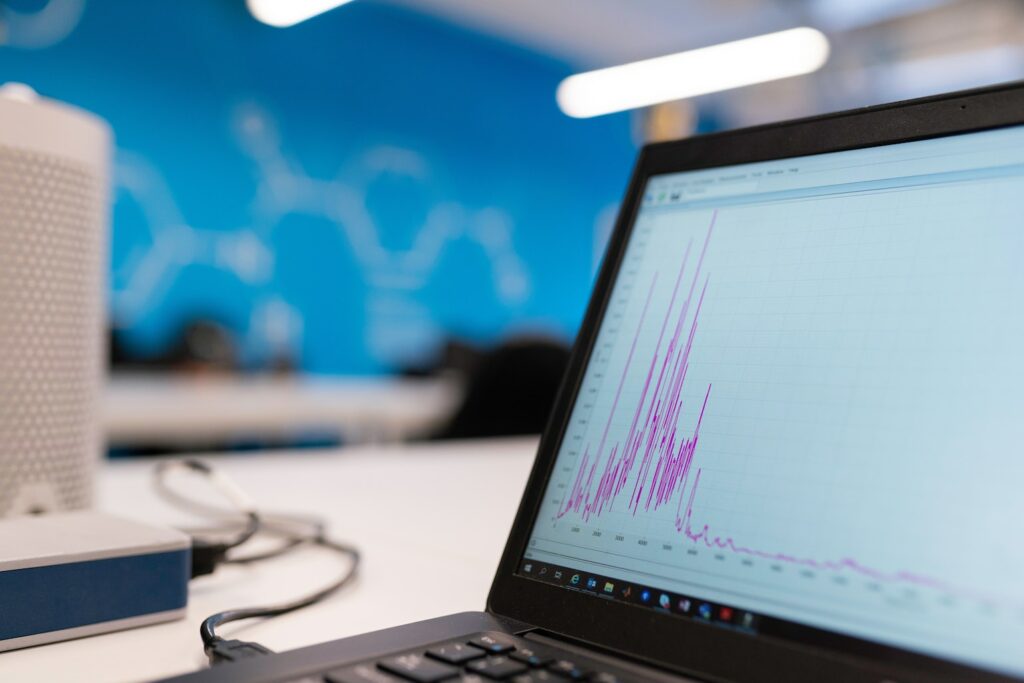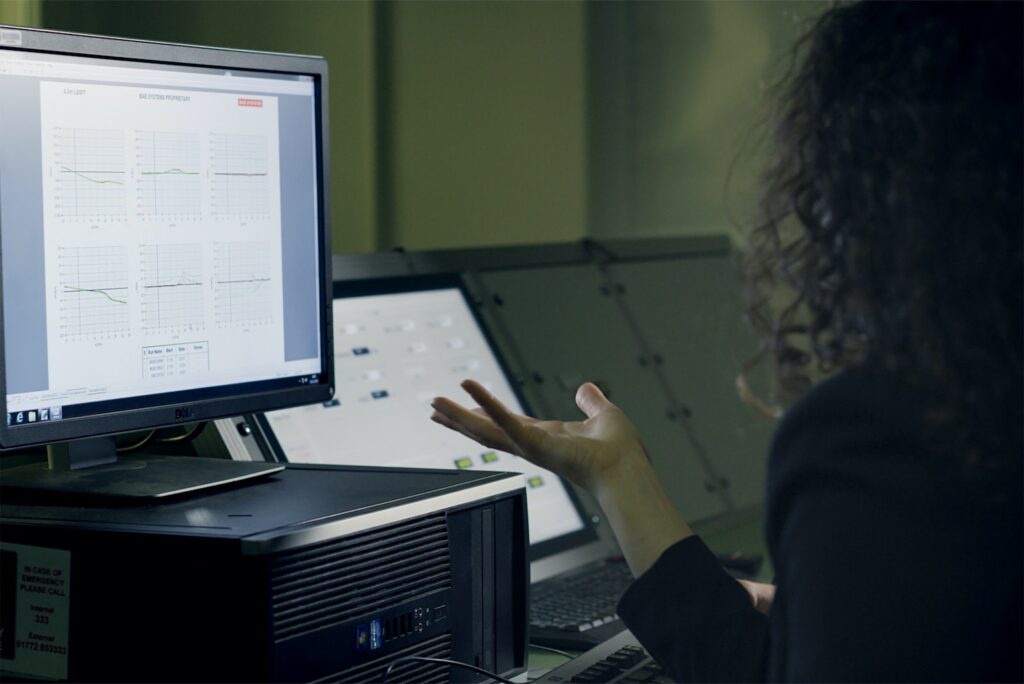Data science and computer science: they’re two types of science that don’t require you to pick up a test tube or wear a lab coat (unless you work from home and that’s your style, at least!). 🧑🔬
But while they share some similarities and a lot of overlap, data science and computer science do have very distinct focuses and career paths.
So, what’s the difference between computer science and data science? And which is better for you to pursue as a career?
In this post, I’ll break down the biggest differences between computer science and data science, which one earns a bigger salary, the skills and strengths you’ll need to use in each career, and which field could be right for you!
What Is the Difference Between Data Science and Computer Science?
They both have “science” in the name and often both deal with coding—so for those who aren’t immersed in the tech industry yet, computer science and data science can sound very similar.
So on a high level, what’s the data science and computer science difference? Let’s start with the definitions.
➡️ Computer science is the study of algorithms, computation, data structures, and the principles that underlie the design and development of computer systems and software.
➡️ Data science is a specialized field that deals with finding useful information from big sets of data using scientific methods, algorithms, processes, and systems.
Put simply, computer science focuses on making computers work well (e.g., develop efficient algorithms, improve the overall efficiency of computer-based systems), while data science focuses on using data to make smart decisions based on information and patterns.

The relationship between computer science and data science
Since data science often relies on concepts and tools from computer science, you might say that data science is an offshoot of computer science, or falls under the computer science umbrella. Generally speaking, CS is more general and DS is more specialized.
Computer science provides the foundational principles, algorithms, and techniques that enable data science to manipulate, analyze, and derive insights from data.
As one Redditor put it, “Data science is not the continuation of computer science, it is the continuation of statistics/analytics, using computer science.”
Many people start their tech careers in software engineering/CS-based roles and transition into data science later.
It’s less common to see it happen the other way around, although it can definitely happen!
Is data science harder than computer science?
Both fields definitely have their own challenges. However, because data science is a much more specialized role, it’s harder to just jump right in as a total beginner.
You can start learning computer science from scratch, but data science will usually require you to build foundational skills (including CS skills!) before you begin any data-specific training.
If you’re totally new to tech, just keep that in mind!
Start coding now
Stop waiting and start learning! Get my 10 tips on teaching yourself how to code.
☝️ Back to top
Data Science vs Computer Science: Which Is Better for Your Personality?
The decision between computer science vs data science should be based on your interests, strengths, and what you enjoy doing the most.
Consider computer science if…
Let’s start with four reasons why you might be drawn to studying computer science.
1. You enjoy coding and programming
If you love writing code and creating software, computer science should be a natural fit. Many people who study general computer science go into software development careers.
2. You love to develop new things
In computer science/software engineering, you often get to build new things. In data science, it’s more about analyzing and drawing conclusions based on existing data.
That’s why this redditor says, “I personally prefer software engineering as a career. You get to create more stuff, ship it, and see it affecting things.”
3. You love to see immediate results of your work
Similarly, with software engineering/CS, you more often get to see the direct results and impact of your work when compared with data science.
A data scientist on reddit commented, “The only thing that I don’t like about DS is that I don’t get to see the [immediate] results and within that time there are certain requirement changes and data changes which makes the previous analysis kind of obsolete and the work is mundane.”
4. You’re not exactly sure what you want to do yet
Especially if you’re trying to decide between computer vs data science as a college major or learning path, going for CS first can build your foundation and give you a broader set of knowledge and skills.
You can then choose to specialize in something like data science later on.

Specialize in data science if…
Next, here are four reasons why data science might appeal to you more.
1. You enjoy working with data
If you find joy in analyzing and interpreting data to find patterns and insights, data science could be a great fit for you.
You’ll spend a lot of time focused on spotting patterns, revealing hidden trends, solving problems, making predictions, etc.
2. You’re interested in statistics and mathematics
Data science heavily relies on statistical techniques and mathematical modeling—so if you loved learning about statistics and probability in school, you’ll get to use those skills every day as a data scientist.
One redditor comments, “I wouldn’t necessarily say data science uses more math, but rather data science uses different math than CS. The math used in data science is primarily statistics, probability, and linear algebra. CS on the other hand uses everything from discrete math (algorithms and data structures), to abstract algebra (used heavily in cryptography), in addition to the math used in data science.”
Another adds that “software engineers barely use any math on a day-to-day basis,” so if you’re not super into math, you can still make a CS career work.
(But if you’re wondering whether you can become a data scientist without math skills, you’ll have more of an uphill battle.)
3. You love solving real-world problems
Data scientists often work on projects that have a direct impact on business decisions and various industries.
This software-engineer-turned-applied-data-scientist writes on Medium: “The main reason I made the transition was to have more interesting problems to work on, and it aligned better with the way I solve problems.”
4. You like experimentation and less rigidity
Data science thrives on experimentation. The field encourages data scientists to explore, innovate, and try novel approaches to extract insights and solve complex problems.
One redditor chose data science because “I like stats, exploring data, and dealing with ambiguity. I found [software engineers] are great at producing logic machines that have a clear input and output. This was always too restrictive to me. Data science involves a lot of experimenting and that fits my personality.”

If you’re still torn, try other fields that combine various aspects of data science and computer science, such as data engineering.
That’s what this redditor did: “I moved around between both fields. I did software and electrical engineering in aerospace for a while, but then made a complete switch and moved into data science. I found it very interesting, but after two years started missing the software engineering side of things. I found a middle way by moving into data engineering, which is more niche and combines the best of both IMHO.”
☝️ Back to top
Computer Science vs Data Science Salary, Job Market, Etc.
On a practical level, what can you expect out of data vs computer science careers? Let’s take a look at the typical data science vs computer science salary potential.
Data science vs computer science: salary & earning potential
A data scientist earns an average of $124,300 per year in the United States. As for earning potential, the high end for data scientists is $188,600.
A general “computer scientist” earns $106,500 per year, on average. However, software engineers (which is what you usually become with a computer science degree) earn nearly $116,000 per year. The high end of a software engineering salary falls at around $185,000.
That means data scientists may expect to earn slightly more money than software engineers. That makes sense, seeing as data science is often considered a specialization of computer science, and often requires additional specialized knowledge.

Computer vs data science job market
At the time of writing, there are 24,333 jobs on Indeed with “software engineer” in the job title, compared with 2,985 jobs with “data scientist” in the job title. That’s a big difference!
This means it could potentially be easier to find a job if you go the computer science route vs data science.
(Of course, it’s dependent on where you live and other factors—e.g. there may be fewer data scientist jobs, but also less competition/fewer qualified candidates.)
Fortunately, both fields have a wealth of job opportunities in various locations, including major cities and tech hubs worldwide. Some of the top locations for tech jobs include Silicon Valley, Seattle, New York City, London (UK), Bangalore (India), Toronto (Canada), and Singapore.
Roles in data vs computer science
Job titles relevant and adjacent to data science include:
- Data scientist (of course)
- Data analyst
- Machine learning engineer
- Data engineer
- Business analyst
- Data consultant
Computer science roles may include:
- Software developer/engineer
- Web developer
- Cybersecurity analyst
- Systems analyst
- Database administrator
- AI engineer
A lot of the skills in these tech careers overlap, so you don’t have to be stuck on one path forever. It’s always a good idea to keep learning, growing, and discovering new passions!
Industries that use computer vs data science
Since almost every company in every industry deals with and collects data, data scientists can find work in essentially any industry—technology, finance, healthcare, marketing, retail, transportation, etc.
Computer science professionals can also work in nearly any industry, but will most commonly find work in industries like software development, cybersecurity, gaming, artificial intelligence, and robotics.

Job satisfaction: data science vs computer science
According to CareerExplorer data, job satisfaction is just about equal between computer science vs data science jobs:
- Data scientists rate their career happiness at 3.3 out of 5 stars
- Software engineers rate their career happiness at 3.2 out of 5 stars
These might not be “go to work every day with a grin” levels of happiness, but you also aren’t likely to hate either job! And there are always things you can do to improve your personal job satisfaction.
Do some research and consider the work culture, job responsibilities, and career growth potential when selecting between data science vs computer science.
If you don’t want to move from where you currently live, see what the job market is like in your area. You may want to choose the path that has more local opportunities.
(Keep in mind, though, that remote work is also usually an option for both career paths, so location may not even factor into your decision.)
Start coding now
Stop waiting and start learning! Get my 10 tips on teaching yourself how to code.
☝️ Back to top
Data Science vs Computer Science: Which Is Right for You?
If you’re choosing a major (or still contemplating pursuing a degree), many people recommend getting a computer science degree and then later specializing in data science. This is because computer science gives you the fundamental base knowledge you need to really excel in data science.
You could also look at job postings and figure out what you’d like to do as a career first. Then look at the courses/electives for each available major and find the one who would best prepare you for the career you’ve chosen.
But ultimately, the answer to this question of working in computer science vs data science really just depends on your individual preferences and goals.
Both will earn you a great salary and both have great job market prospects. You may just have a longer learning runway if you’re a beginner interested in data science, so be prepared to invest the time and effort into working your way up. From there, the tech career world is your oyster!

